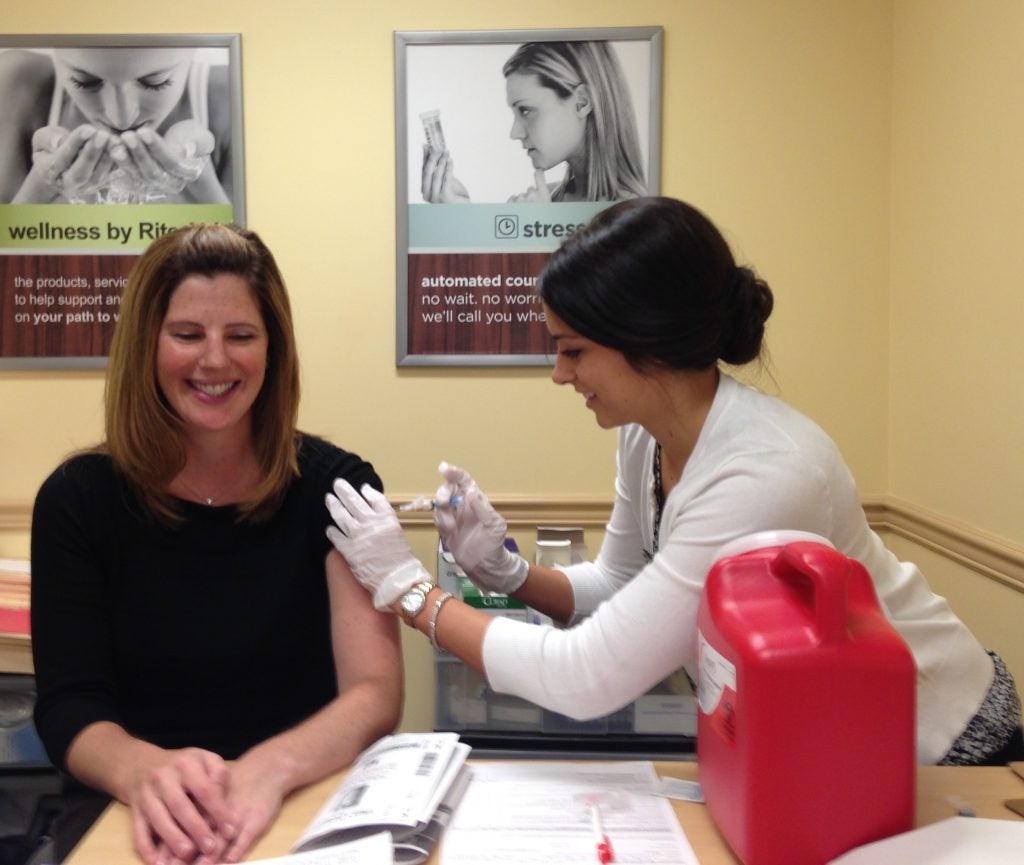COP ranked among top 10
in the nation for post-graduate residencies
The University of Rhode Island pharmacy students who seek to go beyond management of medication in their postgraduate careers are finding that the University’s College of Pharmacy gives them a leg up on the competition.
As the nation’s pharmacists play an increasing role in health care delivery, students are finding that the competition for acceptance to strong post-graduate residency programs is on the rise.
Match rate exceeds national average by 23 percent
The University’s pharmacy program ranked 10th among 127 schools in 2014 for matching 86 percent of its participating students with an appropriate post-graduate residency program, according to Kristina Ward, an associate professor of clinical pharmacy who oversees URI’s Residency/Fellowship Preparation Program. The national average match rate is 63 percent. Regionally, URI and the University of Connecticut are tied for first among seven New England schools with pharmacy programs. URI ranked ahead of schools such as Ohio State University, the University of Kansas and the University of Wisconsin.
Candidates submit applications to a nationwide pool and identify residencies that would be among their top choices. When a residency program also lists a candidate among its top choices, a match is made and the student is awarded the residency. URI co-sponsors three residencies in Rhode Island with Rite Aid, Coastal Medical and Lifespan, but students also can seek residencies across the country.
“Several years back, we recognized that pharmacy residency programs were becoming much more competitive, so we decided to put together a formal program to help students through the process of identifying, applying and getting accepted to a post-graduate residency,” Ward said.
“We have some excellent students who are very competitive nationally,” said Paul Larrat, Interim Dean of the College of Pharmacy. “We have an organized approach to get them ready to apply for their residencies and their hard work is paying dividends.”
URI’s Residency/Fellowship Preparation Program consists of mock interviews performed by faculty, reviews of students’ resumes and letters of intent, and feedback that allow URI students to submit polished applications that make them more attractive candidates.
“I think our high match rate speaks very highly of the students,” Ward said. “We have some really motivated students who love pharmacy, and they’re matching with really high-caliber programs across the country, as well as here in state. Some students want to be at the front line to push the limits of what pharmacists can do, to work at the top of their license.”
Corinn Martineau, ’14, is one of those individuals, in the midst of her post-graduate year one residency with varying roles at Rite Aid, the Visiting Nurse Services of Newport and Bristol counties and URI.
Martineau, of Smithfield, R.I., is participating in multiple clinical services initiatives at Rite Aid, in which she delivers immunizations to patients – a role previously associated with primary care physicians and nurses. She also conducts home health care visits with patients through the visiting nurses program, and she spends time teaching pharmacy students at URI.
Martineau said the residency application process can be intimidating, but with the support of Ward and the URI College of Pharmacy faculty and staff, she found it much more manageable.
“They taught me how to prepare myself, the qualities of a competitive candidate, and they really paved the way for me early on in my academic training, which is great,” Martineau said. “There are many steps you need to take early on to be competitive when you graduate because so many students are applying now. The program really helps you manage stress while you apply, and they guide you in the right direction.”
Martineau will continue her education with a second-year residency. She was recently matched with Maine Medical Center, where she will specialize in ambulatory care performing outpatient services. She will mostly work with patients who have been recently discharged from the hospital, managing medications to help patients achieve a good outcome.
The second-year residency typically allows a resident to begin specializing in fields such as oncology or hospice care, for example, while first-year residencies are more broadly based. Students who complete post-graduate residencies are able to make treatment decisions and prescribe medications, as they gain provider status.
Ward said many hospitals now include pharmacists as part of interdisciplinary teams that provide care collaboratively with physicians and other providers. A doctor may diagnose a patient and decide that person needs an antibiotic, then leave the decision on which antibiotic the patient should take to the pharmacist.
For Martineau, working directly with patients is what drives her to complete her two years of residency. Martineau’s parents both work in a hospital and a family member once owned a retail pharmacy. Her experience growing up around health care and pharmacy inspired her to combine the two.
“I really wanted a pharmacy career that requires more patient care,” Martineau said. “Actually communicating with the patient, face-to-face, is what pushed me to do my residencies. It’s such a cliché, but why do you become a pharmacist? To help people!”
Media Contact: Brian Pernicone, 401-874-7245


